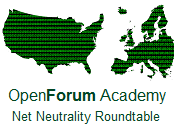Regulating a Borderless Internet: EU vs. US Perspectives on Net Neutrality
by Frode Sorensen
4th March 2015 OpenForum Academy organized a Roundtable at the European Parliament in Brussels, discussing regulatory aspects of Net Neutrality, comparing EU and US perspectives, their differences, similarities and implications for the continued openness of a Borderless Internet and in terms of regulatory requirements for companies active in both sides of the Atlantic.
Summary of speech given at the Net Neutrality Roundtable by Frode Sorensen, Norwegian Communications Authority (Nkom).
Text from the White Paper CC BY SA 4.0 OpenForum Europe:
Net Neutrality in Norway
Mr. Frode Sorensen provided a quick overview of the Norwegian perspective on Net Neutrality as regulated by Nkom, the Norwegian Communications Authority. Nkom adopted a co-regulatory approach and launched the Norwegian guidelines on Net Neutrality in 2009 which is now the longest running Net Neutrality regime in Europe. Co-regulation is an approach in which the regulator co-develops guidelines along with the industry and thus goes beyond the self-regulatory approach that typically focuses on transparency issues only.
The co-regulatory approach that was adopted in Norway produced guidelines that are comparable to the European Parliament’s decision in 2014. In addition to addressing transparency issues, the Norwegian guidelines also allow for specialized services. Furthermore, the rules are clearly prescribing non-blocking and non-throttling as well as criteria for reasonable traffic management.
Rough comparison Europe vs. US
A comparison between the European approach to Net Neutrality and the respective FCC rules in the US is provided in the table that follows.
| Europe | United States | |
|---|---|---|
| No blocking | X | X |
| No throttling | X | X |
| No prioritization | X | |
| Specialized services | X | X |
| Ban zero-rating | Case by case | |
| IP interconnect | Case by case |
The European and US approaches to blocking, throttling and specialized services are rather similar. However, the FCC has included prioritization aspects that have not been addressed by European policy makers yet. Moreover, banning zero-rating has been explicitly mentioned the FCC rules along with some aspects concerning IP interconnecting that are to be approached and examined on a case by case basis.
Specialized services
Specialized services introduce an extensive exception from Net Neutrality. For instance, in the Norwegian guidelines of 2009 operators were provided with an opening to launch and provide such services that do not need to adhere to Net Neutrality rules. However, in order to create this opening and at the same time protect Net Neutrality, specialized services must be (virtually or physically) separated from Internet Access Services (IAS) at the network layer and must not be provided at the expense of IAS.
There have been quite diverging opinions across Europe regarding the need to protect specialized services. However, specialized services utilize built-in QoS mechanisms, they should therefore not need protection against IAS. It is in fact the other way round – IAS needs protection against specialized services.
Application-agnosticism
The provision of application-agnostic traffic management allows ways for operators to differentiate their service offers without breaching Net Neutrality. In particular, differentiating service offers based on access speed or data volume is not considered as a violation of Net Neutrality as long as all applications are treated equally. And the other way round, any differentiation based on specific content or applications would constitute a breach of Net Neutrality. The same principle applies in the case of zero-rating as well, where specific content or applications are favored based on the choice of the operators themselves instead of the end-users. However, in the Norwegian point of view it is end-users that should decide how they would like to use their IAS.
It is also possible for telecommunications operators to have an application-agnostic QoS-architecture where the end-user is in control of this quality function, e.g. as proposed by Barbara van Schewick. However, this particular idea has not been included in neither the US nor the EU Net Neutrality regulation, but it is definitely a possibility that should be explored in the future.
Do we understand the value of the Internet?
Mr. Sorensen concluded his presentation by pondering on the difficulty to reach an agreement on the Net Neutrality debate: “Is it because we do not understand the value of the internet or is it because we do not understand to a sufficient extent how the internet works”? When attempting to answer this question, one should keep in mind that:
- The Internet is different from traditional telecommunication.
- Reverse engineering telecoms into IP can hardly be called innovation.
- Internet applications are decoupled from the underlying network, which is completely different from specialized services that are typically vertically integrated.
- The internet provides global connectivity and its value is adversely affected in case of blocking or throttling of on-line applications and services. Therefore we should avoid fragmenting the internet through application-specific differentiation.
- There is a need for a pan-European approach to Net Neutrality so as to avoid having divergent policies adopted across European countries.
